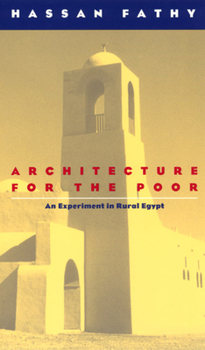Architecture for the Poor: An Experiment in Rural Egypt
Select Format
Select Condition 
Book Overview
Architecture for the Poor describes Hassan Fathy's plan for building the village of New Gourna, near Luxor, Egypt, without the use of more modern and expensive materials such as steel and concrete.... This description may be from another edition of this product.
Format:Paperback
Language:English
ISBN:0226239160
ISBN13:9780226239163
Release Date:December 2000
Publisher:University of Chicago Press
Length:366 Pages
Weight:0.40 lbs.
Dimensions:0.8" x 5.4" x 9.1"
Customer Reviews
5 ratings
economic sided, wish it had more practical engineering
Published by Thriftbooks.com User , 14 years ago
The content is more economic sided than I'd hoped but still a great introduction to the opportunity. I wish it had more practical engineering. I bought this book with the hope that it would aide me in the construction of vault style buildings here in in the southwest desert. I love the idea of the vault style and feel it could be a perfect fit for my projects. New Paria, Utah
A must read for any architect.
Published by Thriftbooks.com User , 21 years ago
For those of you looking for a book on how to build a house cheaply this is not for you. This book is on how to give poor people the means to build homes, and communities, get educated, and develop careers all at the same time. All this can be orchestrated by an architect who understands the needs of the people he is designing for. Every architectural student should be required to read this book.
An economic revolution using mud
Published by Thriftbooks.com User , 22 years ago
'Architecture for the Poor' by Dr Hassan FathySometimes a book is so ahead of its time it can sink beneath the waves before it's appreciated. Such a book was 'Architecture for the Poor', written in 1969 and originally published by the Ministry of Culture in Cairo. Written with the help of a fellowship from the Adlai Stevenson Institute of International Affairs it was published in America by the University of Chicago in 1973 and in a second impression in 1976. But even then it was only taken up by the fringes of the solar energy movement as a neat idea for a different culture and climate. Currently its out of print. The author died in 1989 having received some praise in his home country of Egypt but having seen no actions to take up his ideas for helping peasants take control of their lives by taking charge of the creation of their homes and communities. Dr Fathy was officially an architect but his talents as an amateur anthropologist, sociologist, psychologist, inventor, and economist are what make him great. His holistic approach to solving the housing problems of a poverty level community (and his vision to see how they could be applied to a whole country) takes in the gamut from reviving the craft of mud brick making (along with the traditional masonry building of vaults and domes to roof simple mud structures) through to solving the problems of parasitic worm infections that debilitate entire populations infected through their water supply systems. Every aspect of village life receives his attention: how to adapt an Austrian heating system to make a cooking stove more efficient, how to share a house with cows more hygienically, where to do laundry, how to build a better school, how to provide an alternative income from tomb robbing for the peasants, and how to tactfully delouse peasants using the luxury of a Turkish bathhouse rather than the chilly chemicals of a government mandated cold shower. His appreciation that some inefficiencies are functional within a society makes the changes he does make even more impressive. Fetching water from the village pump in water jars is one of the few occasions a girl has to be seen out in public in Moslem society. Providing running water to every house would derail the marriage process within that society. However he is happy to create plumbing inside the home ? running pipes to the kitchen from rooftop storage jars across the middle of rooms, so if they leak the occupants will have to fix them not ignore the drips until the wall is eroded. Fathy's changes are not just improvements to make a peasants life more like a modern westerners life ? that is impossible given the astonishingly low income of these people. They are changes that make life easier or healthier while striving to maintain traditions and strengthen society because they understand what is behind the tradition. For example splitting the village up into single home farmsteads would expose the individual families to roaming bands of thieves, s
Principled Professionalism
Published by Thriftbooks.com User , 24 years ago
This book should be required reading to obtain an Architect's license. Mr Fathy is far from perfect, but his message of democratic economy is desperately needed and eloquently stated, and his mixture of respect for and scientific evaluation of traditional building techniques is inspiring.
A new theory in architecture by a famouce Egyptian architect
Published by Thriftbooks.com User , 26 years ago
This book sets a new theory in architecture by the famouce Egyptian architect Hasan Fathy. Fathy argues that you can build fancy buildings without using expensive materials. He practiced his theory in Upper Egypt, Mexico, and many other countries.




